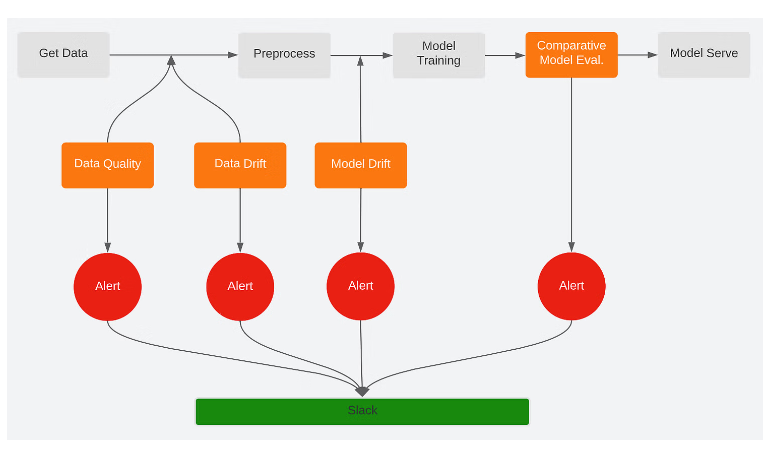Practical framework of monitoring an End-End ML Loan prediction model using Airflow and Docker
- Basic experience with training a machine learning model using scikit-learn or xgboost
- Basic experience with serving a pretrained using flask
- Basic familiarity with Postgressql
- Experience with docker and docker-compose
- Basic statistics on hypothesis testing
The data is available in code>main>dags>data>raw location.
Kindly upload the data and provide the appropriate credentials in code>main>dags>creds.json file.
ML pipeline monitoring using:
- Deepcheks
- Airflow
- Slack integration: alerts
Here we will simply setup our environment using docker.
-
Make sure docker and docker-compose are setup properly
-
Make a github repo an check in all the code which can be found here.
-
Clone the gitrepo:
git clone git@github.com:your git address -
To proceed, make sure
- Docker can have access to at least 4GB of Memory on your system
- Navigate to
dags/src/config.pyand ensureRUN_LOCALis set toFalse
-
While in the same home directory as
docker-compose.pystart docker-compose by issuing this command on you terminal:docker-compose upThis will take a couple of minutes to boot up all containers. To check if all containers are running properly, you can rundocker ps --all. You should see a list of all containers inhealthystatusCONTAINER ID IMAGE COMMAND CREATED STATUS PORTS NAMES 5dea90526ec4 apache/airflow:2.2.4 "/usr/bin/dumb-init …" 23 hours ago Up 23 hours (healthy) 8080/tcp project_01_model-testing_airflow-scheduler_1 b27cf17c76d4 apache/airflow:2.2.4 "/usr/bin/dumb-init …" 23 hours ago Up 23 hours (healthy) 8080/tcp project_01_model-testing_airflow-triggerer_1 b254faa326cb apache/airflow:2.2.4 "/usr/bin/dumb-init …" 23 hours ago Up 23 hours (healthy) 0.0.0.0:5555->5555/tcp, 8080/tcp project_01_model-testing_flower_1 79af795c2ab2 apache/airflow:2.2.4 "/usr/bin/dumb-init …" 23 hours ago Up 23 hours (healthy) 8080/tcp project_01_model-testing_airflow-worker_1 cfe8d1b18f77 apache/airflow:2.2.4 "/usr/bin/dumb-init …" 23 hours ago Up 23 hours (healthy) 0.0.0.0:8080->8080/tcp project_01_model-testing_airflow-webserver_1 c68fc80dbf0d postgres:13 "docker-entrypoint.s…" 23 hours ago Up 23 hours (healthy) 5432/tcp project_01_model-testing_postgres_1 5c0b9f136b75 redis:latest "docker-entrypoint.s…" 23 hours ago Up 23 hours (healthy) 6379/tcp project_01_model-testing_redis_1
-
Delete all files under the following subdirectories. In case subdirectories do not exist (due to .gitignore) please create them
dags/data/raw/*dags/data/preprocesseddags/modelsdags/results
At the end, the directory should be structured as following (ensure to manually create any directory that is missing)
├── airflow.sh ├── dags │ ├── app.py │ ├── credentials.json │ ├── dag_pipeline.py │ ├── dag_training.py │ ├── data │ │ ├── preprocessed │ │ │ ├── │ │ └── raw │ │ ├── │ ├── main.py │ ├── models │ │ ├── deploy_report.json │ ├── results │ │ ├── │ ├── src │ │ ├── config.py │ │ ├── drifts.py │ │ ├── etl.py │ │ ├── helpers.py │ │ ├── inference.py │ │ ├── preprocess.py │ │ ├── queries.py │ │ └── train.py ├── docker-compose.yaml ├── jobs ├── logs │ ├── ├── plugins ├── readme.md └── requirements.txt -
Truncate the
mljobtabletruncate mljob;
- data gathering
- data preprocessing
- model training
- model evaluation
- model serving
- data integrity
- data drift
- concept drift
- comparative analysis of models
